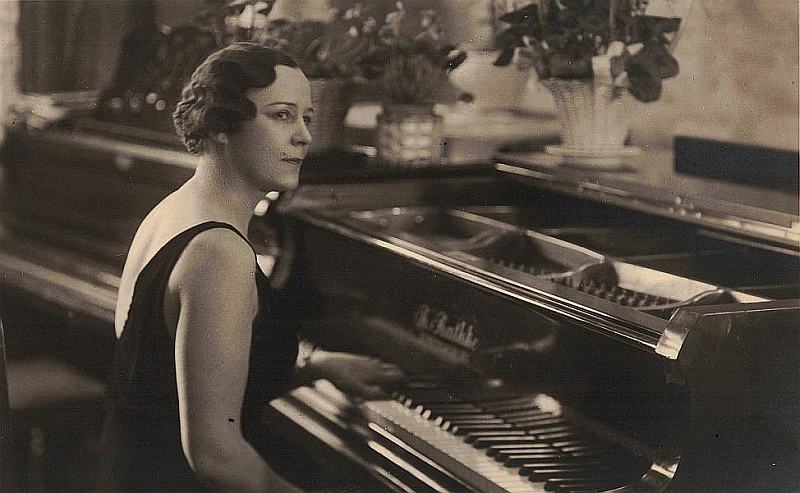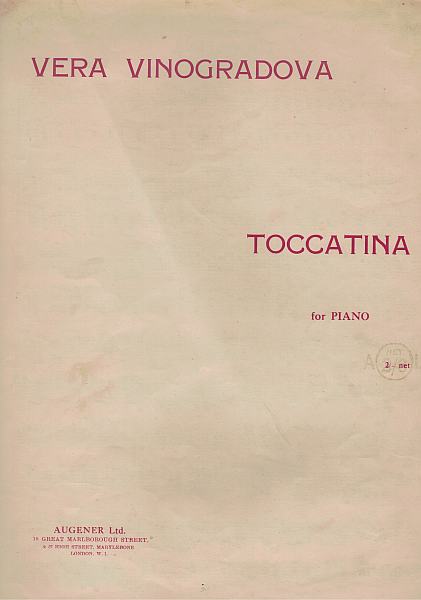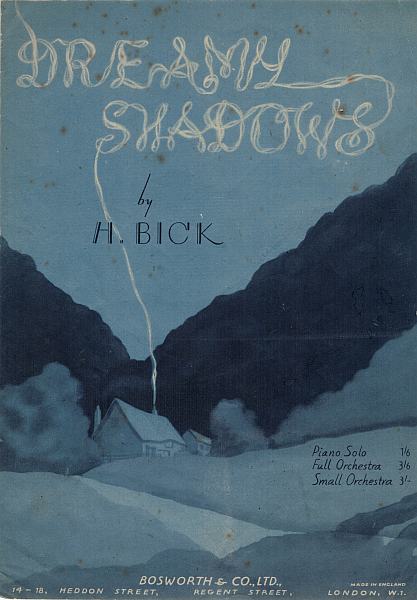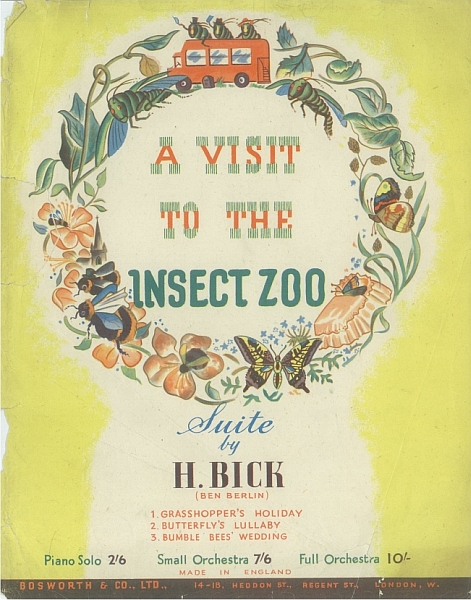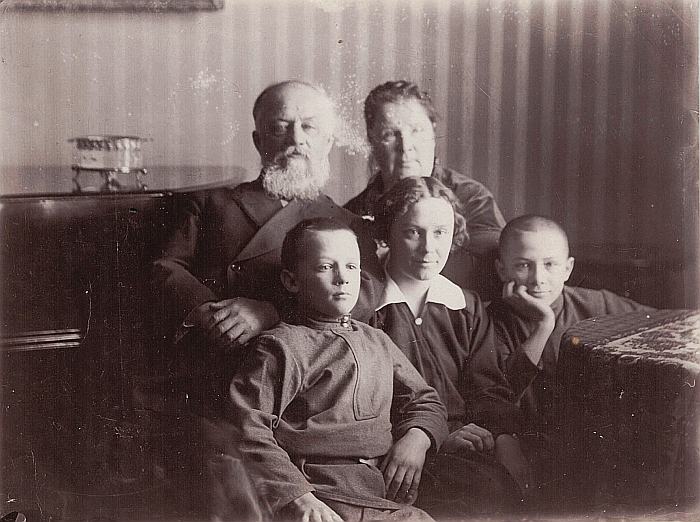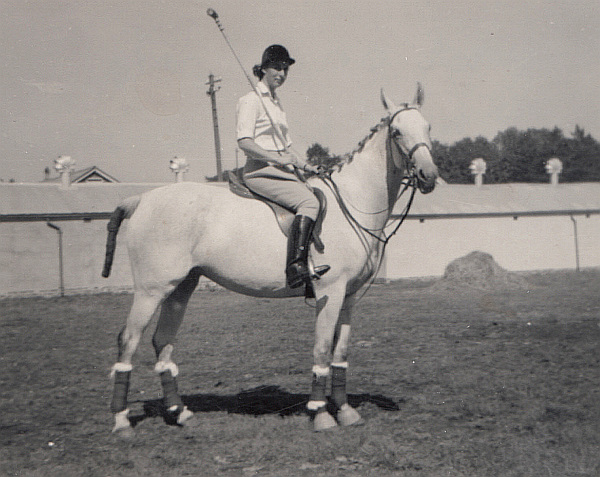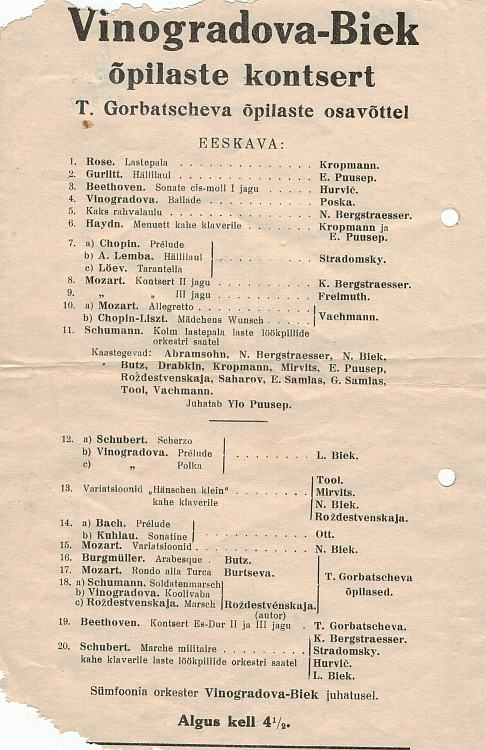 Mälestused/Jutustused
Mälestused/JutustusedВоспоминания/Рассказы
Memoirs/Stories
 Mälestused/Jutustused
Mälestused/Jutustused
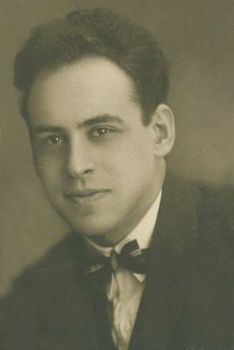
"Hermann Biek was a composer with a God-given talent. Being a pianist ruined him, as well as his inability to sell art."
"In London, he became involved in jazz. He had a small band and wrote music for it day and night…
He was 40 when he died at his desk – without realizing his immense talent."
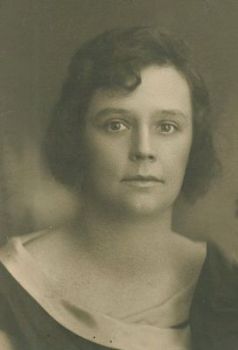
(Maria Yudina, A Little about People of Leningrad)
"Now I know for sure that these lessons actually comprised my entire theatrical training, for, although I never became a musician, all my work is an attempt to embody what I had learned from my extraordinary classes with Mrs. Biek."
(Peter Brook "Threads of Time: Recollections")
In 1863, a young man from Vilno (Vilnius) arrived at Revel (now Tallinn). He was about 20-years old, full of energy and conviction that this would be a good place to settle and find a job in his professional field. His name was Moische Biek.
Revel, unlike his native Vilno, was not within the Pale of Settlement (a part of Russian Empire where Jews had the right to live); therefore, there were only about 450 Jews in the city, which meant less competition for Moische.
Moische was a bookbinder, or, according to an official stamped paper, “a bookbinding master.” He came on his own risk, since the law allowing Jewish craftsmen to live beyond the Pale of Settlement was issued only two years later (June 28, 1865). Indeed, he became quite successful. Moische married the Jewish young woman, Dvora (Vera in Russian), and his family was growing. In 1867 his son David was born, and in 1868 – his son Leib (Leopold).
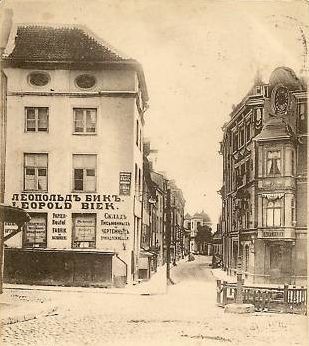
David became a tinsmith and opened his own shop. Leopold followed in his father’s steps and became a bookbinder. Leopold had a lot of commissions, his business was growing, he started selling office supplies and cardboard, bought his own warehouse, and unwittingly became a successful trader. He probably didn’t notice this transformation, but the authorities did. The problem was that, according to the Czar’s directive of 1865, Jewish craftsmen were allowed to live beyond the Pale of Settlement only as long as they continued working in their proclaimed field.
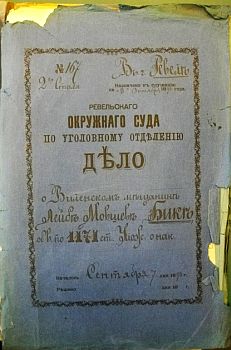
Either somebody “assisted” in this matter, or the authorities themselves discovered these “criminal” activities, in any case, on October 8, 1893, Leopold was prosecuted and got his sentence: expulsion back to the Pale of Settlement. But he was not willing to go back to Vilno.
Leopold had to face his dilemma: if a Jew was not allowed to work in a different occupation, he needed either to stop working or to stop being Jewish. On June 11, 1894, Leopold converted into Lutheran faith. Not being Jewish, he was free to live and work anywhere in Russia, including Revel. Consequently, his case was closed. His Jewish wife from St. Petersburg, Maria Abramovna Fleischacker, did not convert, and according to Jewish religious laws, her children stayed Jewish.
Under these circumstances, on September 23, 1896, the main character of our story, the little Jewish-looking Lutheran, Hermann Leopoldovitch Biek, was born. The family was quite wealthy; his mother was the daughter of a military doctor from St. Petersburg, so the children, most likely, got a very good education. Hermann and, later, his younger brother Eduard (born 1898) graduated from Revel Real High School and both studied music (Hermann even performed as a young pianist). In 1913, upon his graduation, Hermann enrolled into St. Petersburg Conservatory. Two years earlier, the daughter of a Nizhny Novgorod high level government official, Vera Pavlovna Vinogradova, also became a student there. She was to become Hermann’s wife. Here are Maria Yudina’s recollections:
“Vera Pavlovna Vinogradova from Nizhny Novgorod was a woman of an exceptional charm, idolized by numerous young (and old) musicians who adored her; an author of many short works (mostly, for piano, tons of preludes!!!) – and Hermann Leopoldovitch Biek, Estonian Jew – in their student years at St. Petersburg (later, Petrograd) Conservatory this young married couple were, probably, the most flamboyant personalities among us, the conservatory students.”
“Well, the Bieks and I simply loved each other very much. As I wrote before, I was always extremely, unbelievably lucky with friendships. But my friendship with the Bieks had this inimitable aroma of youth. When they planned their future together, their marriage, I wrote them a poem that started with:
“I saw you bursting to bloom
In his triumphant heart”
(I forgot the rest). I was happy with their happiness, admired both of them, and was proud of them. Verochka was a great hostess, was able to whip up some pastries from nothing, between writing music and giving music lessons. There were her girlfriends, mediocre pianists, who adored her; there were hopeless admirers, including her students – gentle Klements and monumental Danila Amfiteatrov, the writer’s son. The Bieks also had a fox terrier, Flyoshka, to whom Hermann shouted, “Get lost, you soul eating bustard, let me write my music!” Sometimes, Verochka would say, “Hermann, put on the samovar!” The composer replied, ”I feel no impulse,” and leave for his small narrow room to compose; so Vera and I had to do this ourselves.”
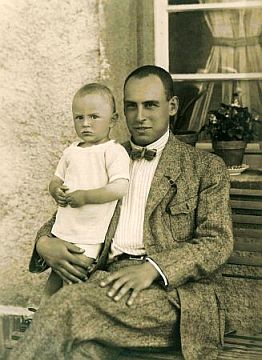
Hermann graduated with three majors: piano, conducting, and composition. He received three awards and was offered to stay as a piano instructor. Vera graduated in piano and composition. Glazunov, who was her professor, gave her an excellent recommendation. She was also offered a teaching position.
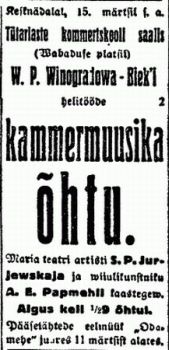
The year was 1920. It was not an easy time. Russia went through the revolution, there was a civil war, people suffered from hunger and cold. Estonia announced its independence in 1918, and the war was over by the beginning of 1920. There was a common euphoria and a relative well-being. Vera and Hermann were expecting a baby. Maria Abramovna insisted that her son moved to Tallinn – “if only for the future child.” The first-born, Leopold-Leo (named after his deceased grandfather, as the tradition required), was born in the end of 1921, in Tallinn.
In Tallinn, Vera and Hermann continued to compose music and sometimes performed as pianists. Vera Pavlovna was teaching. Anna Feinstein, a piano teacher, and even my mother studied with her. Everything would be fine; however, Tallinn – being a relatively small city – could not provide enough opportunities for such talented musicians as Vera and Hermann Biek. Rare concerts in Berlin and other European cities did not solve their problems, and in 1927, they moved to Berlin.
Big city, the center of the theatrical and musical life of Europe at that time! The glamorous Berlin of the 20s! Apparently, Vera and Hermann had big plans, and they immerged into composing, were preparing for concerts. Alas, Berlin of that time was more a city of cabarets and theaters than classical music halls. Hermann became an artistic director, pianist and arranger for the record company VOX.
In 1928, he established his own orchestra, Ben Berlin Tanz Orchester, and acquired a stage name Ben Berlin. The same year he got a job with the famous company Deutsche Grammophon. While the records of the orchestral music are still available, and the internet is full of Ben Berlin Tanz Orchester music, we found only two records with Hermann playing piano solo (one - under his real name and another - under Ben Berlin). Here they are:
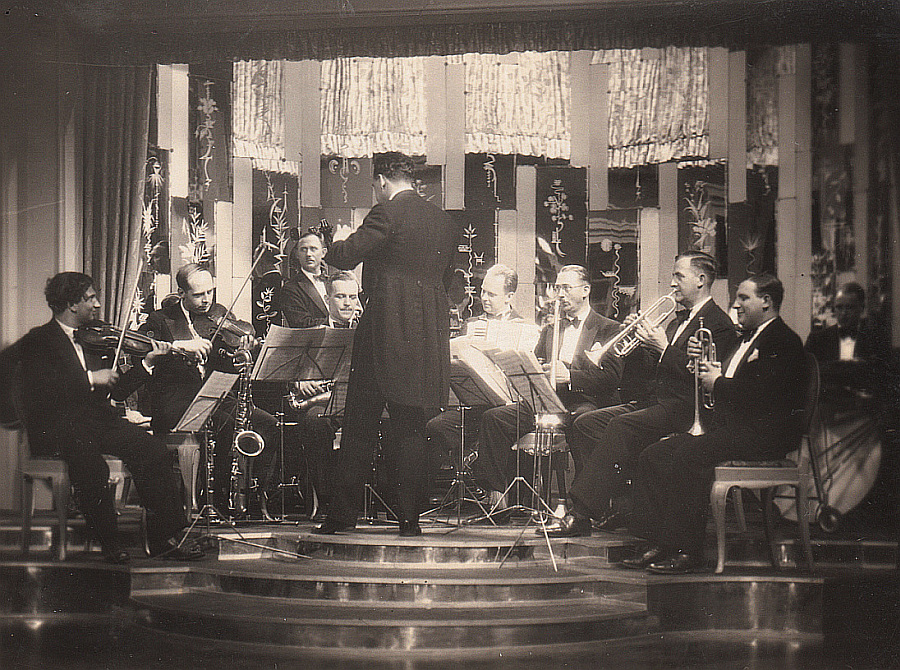
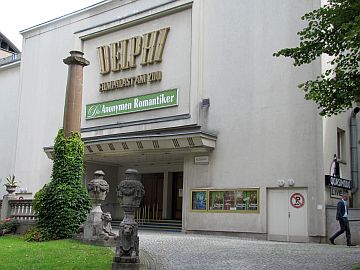
The Ben Berlin orchestra became one of the most popular orchestras in Germany, and many leading soloists of that time performed with it. The orchestra records were sold in many countries, including South America and Japan. The orchestra’s individual rhythmic stile earned it a nickname “the musical ambassador” of America in the continental Europe. The “Delphi” hall (now a movie theater) where the Biek’s orchestra played was always full. Money, fame and… deep disappointment.
Here is the only film clip where we can see Hermann “in action.” This clip includes an excerpt from the 1930 movie "Wien, du Stadt der Lieder." The music is performed by Ben Berlin Tanz Orchester, conductor – Ben Berlin (Hermann Biek).
Here you can listen to, probably, the most complete collection of Ben Berlin's orchestra records. This site has been developed by a great music lover and collector, Valdo Praust from Tallinn.

The year was 1933. Nazi Germany introduced a number of anti-Jewish laws. Staying in Germany was not safe. Apparently, Vera with Leo returned directly to Tallinn (at least, in 1934 Vera was teaching in Tallinn and even became a chairwoman of the Russian Theater & Music Society’s music section). Hermann moved from one European country to another: Holland, Austria, France and, finally, England. In 1934, Hermann gave several piano concerts in Estonia. The press praised his skills and expressed regrets about the music halls not being full.
In 1936, Hermann, Vera and their children (son Leo and daughter Nina) moved to England for good. Vera Pavlovna gave private music lessons. Anthony Bailey remembered:
"From 1942 onwards, I learned piano from a Russian emigre Mrs Vinogradova Biek, who was teaching Peter Brook, later Director of the Royal Shakespeare Company, and Peter Ustinov. They were years older than me, but we performed in the Bluther studios and the Rudolf Steiner Hall."
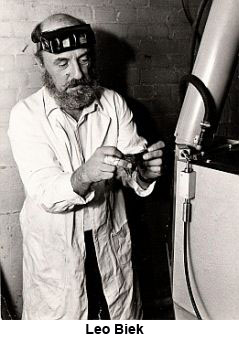
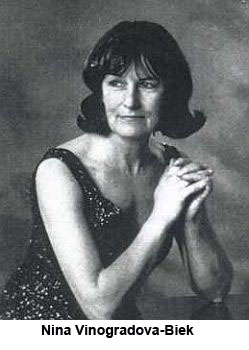
Hermann also taught music, continued to compose and arrange. According to Maria Yudina, he died in 1944 sitting at his desk.
Vera Pavlovna continued teaching music. She died in London in 1982. On my first visit to London in the beginning of the 1970s, I called Vera Pavlovna upon my mother’s request and gave her regards from her former Tallinn students. Vera Pavlovna invited me for lunch. Her son, Leo, who had become a well-known British Museum expert on archeology, also joined us. Alas, at that time I didn’t have much interest in family histories, and instead of asking Vera Pavlovna about her life, I answered her questions about the life in the USSR. I didn’t even take her picture – for which I cannot now forgive myself.
Her daughter, Nina Vinogradova-Biek, naturally became a pianist performing in England and other countries. My great hope is that she or her children will read these notes and contact me to add something or correct my narrative.
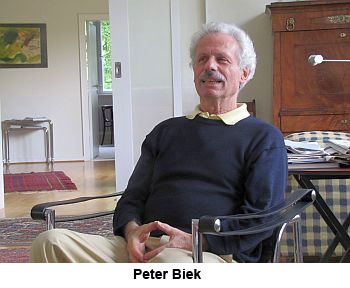
The Bieks dispersed over many countries. The family of Hermann’s younger brother, Eduard Biek, moved to Germany before the WWII taking with them their mother, Maria Abramovna. Their terrifying experiences in Germany during the war years make a separate story. Eduard’s son, Peter, is a well-known architect in Berlin. I am deeply grateful for his assistance.
The grandfather Leopold’s daughter, Lily, married in France, and her family lives there (Koerner). The family of Leopold’s brother lives in Russia. I have no information about any other brothers and sisters.
Quite a lot of time passed, and I didn’t hope to receive any messages from Nina Vinogradova-Biek. And suddenly, totally unexpected, here is the email from her. As a result, a very interesting
and warm communication started. And here I am – in September 2016 – sitting in the cozy garden of my dear new friends, Julia (daughter of Nina’s brother, Leo Biek), her husband Tony and Nina.
One can only envy Nina’s energy. She still performs, takes care of her dear horses (“eternal jokey”), actively participates in the local community life, etc. We are sitting with Nina,
and she recalls some new facts from her life, her parents’ life…
Suddenly Julia appears, with mysterious Mona Lisa smile on her face, and in her arms – old bags, photo albums, concert announcements, sheet music, in other words, a treasure trove!
It turns out that she went down to their cellar, which she hasn’t done for at least past 10 years, and found there all these treasures. We were examining all these materials until I had to leave.
Here are some of the most interesting things. I am very grateful to Nina, Julia and Tony for their warm hospitality and for all their help.

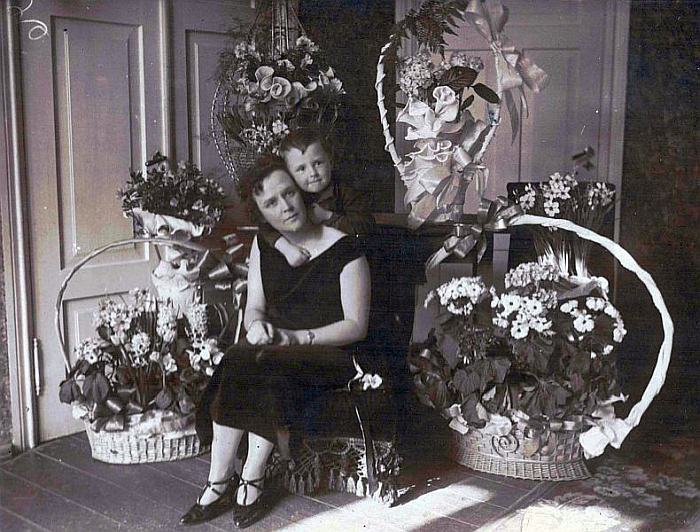 After the concert with son Leo.
After the concert with son Leo.
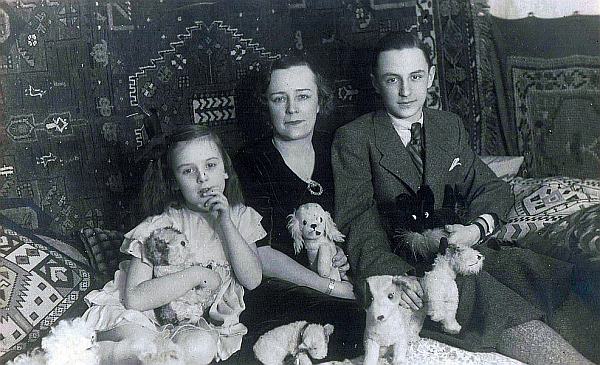
Vera Pavlovna with son Leo and daughter Nina.

